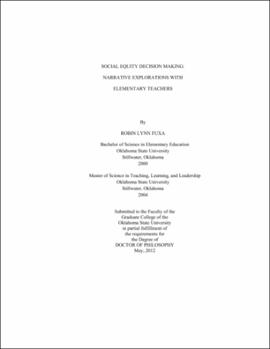| dc.contributor.advisor | Brown, Pamela U. | |
| dc.contributor.author | Fuxa, Robin Lynn | |
| dc.date.accessioned | 2013-11-26T08:34:28Z | |
| dc.date.available | 2013-11-26T08:34:28Z | |
| dc.date.issued | 2012-05 | |
| dc.identifier.uri | https://hdl.handle.net/11244/7405 | |
| dc.description.abstract | Scope and Method of Study: In this critical postmodern narrative study, I explore with my participants their decision making process/es around social equity issues (race, class, gender, social class, sexual identity, religion, etc.) in their teaching. The purpose of this study is to facilitate a closer examination of this important decision making process - when and how to address social equity issues in one's teaching. How do teachers respond to opportunities, planned and unplanned, to foster, exclude, or silence social equity dialogue in their pedagogy? My participants were Oklahoma teachers currently or recently in-service in an elementary setting who exhibit strong autonomy as defined by Kamii (1991) and commitment to social equity education as determined by a participant questionnaire. Participants were recruited through expert referral and ListServ recruitment. Then through two semi-structured interviews, I collected my data and constructed participants' stories holistically in realist tales (Woodbrooks, 1991) as my first stage of analysis. Then I conducted an open-coded theme analysis (Strauss & Corbin, 1998) to arrive at my major themes in which the critical and complicating tales (Woodbrooks, 1991) are interwoven. | |
| dc.description.abstract | Findings and Conclusions: Participants frequently noted a keen awareness of the un/taught, the hidden and null curricula. Un/learning (Wang & Olson, 2009)--both of their own and their students--often arose as well in social equity teaching decisions. Further, participants discussed the importance of a support system for sustaining them in their social equity work. Finally, the magnetism of personal identity seemed to have the greatest influence on what social equity issues my participants did--and did not--address. Like the different ends of a magnet, participants might be pulled toward or repelled from issues closely related to their own personal identities, which seems closely connected to the level of risk the identity category was perceived to hold for the participant in his or her school community. The notion of place loomed large for all participants--rural, urban, suburban, and exurban teachers. It seems essential that we who are committed to social equity education talk with one another about these decisions, both to illuminate the process for ourselves and to foster an ongoing, generative dialogue about how we can and do teach social equity issues here. | |
| dc.format | application/pdf | |
| dc.language | en_US | |
| dc.rights | Copyright is held by the author who has granted the Oklahoma State University Library the non-exclusive right to share this material in its institutional repository. Contact Digital Library Services at lib-dls@okstate.edu or 405-744-9161 for the permission policy on the use, reproduction or distribution of this material. | |
| dc.title | Social equity decision making: Narrative explorations with elementary teachers | |
| dc.contributor.committeeMember | Parsons, Sue Christian | |
| dc.contributor.committeeMember | Wang, Hongyu | |
| dc.contributor.committeeMember | Delinder, Jean Van | |
| osu.filename | Fuxa_okstate_0664D_12076.pdf | |
| osu.accesstype | Open Access | |
| dc.type.genre | Dissertation | |
| dc.type.material | Text | |
| dc.subject.keywords | elementary education | |
| dc.subject.keywords | multicultural education | |
| dc.subject.keywords | social equity | |
| dc.subject.keywords | social equity education | |
| dc.subject.keywords | social justice education | |
| thesis.degree.discipline | Education | |
| thesis.degree.grantor | Oklahoma State University | |
